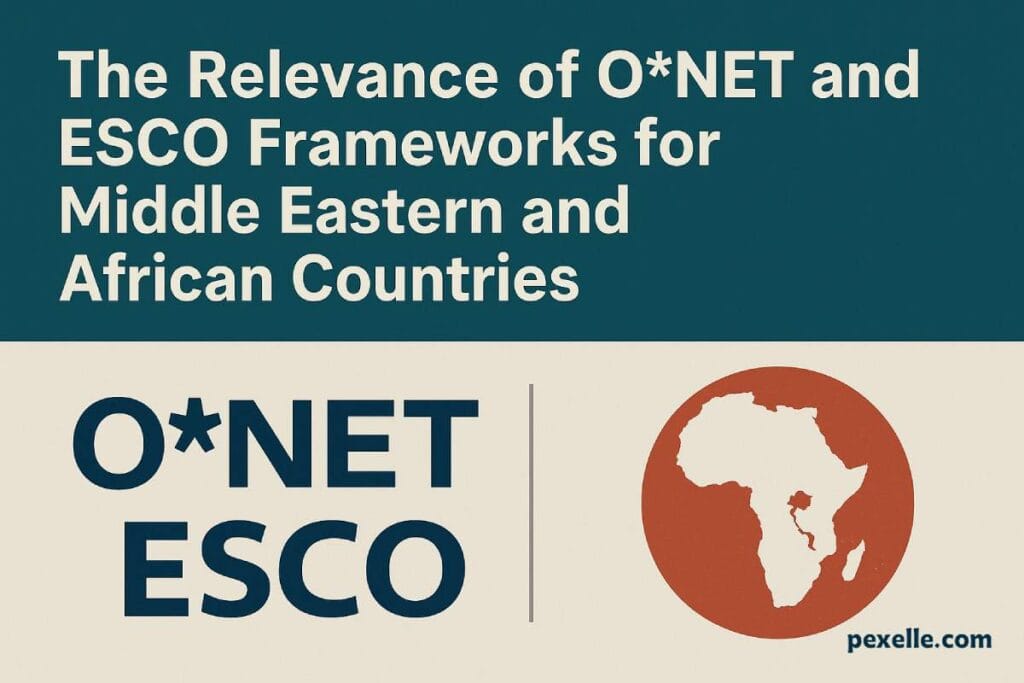The Relevance of O*NET and ESCO Frameworks for Middle Eastern and African Countries

Introduction
In a rapidly evolving global economy, structured skill and occupation frameworks like O*NET (Occupational Information Network) and ESCO (European Skills, Competences, Qualifications, and Occupations) have become essential tools for workforce planning and development. While these frameworks originated in the United States (O*NET) and the European Union (ESCO), their potential applications extend far beyond their regions of origin. For Middle Eastern and African countries—many of which are undergoing economic diversification, industrial modernization, and labor market reforms—these systems can offer significant benefits in aligning education, training, and employment.
Understanding O*NET and ESCO
- O*NET: A U.S.-based, publicly available database that describes occupations in terms of skills, knowledge, abilities, interests, and work context. It is widely used for career counseling, job matching, and labor market analytics.
- ESCO: An EU initiative that provides a multilingual classification of skills, competences, qualifications, and occupations, harmonized for use across different countries and sectors. ESCO integrates occupational profiles with skill definitions, enabling standardized skill recognition.
Both frameworks help create a shared language for skills and jobs, enabling governments, employers, educators, and job seekers to communicate more effectively.
Benefits for Middle Eastern Countries
Middle Eastern nations, particularly those in the Gulf Cooperation Council (GCC), are seeking to transition from oil-dependent economies to knowledge- and innovation-driven industries. Implementing O*NET or ESCO can support:
- National Workforce Planning – By mapping the skills needed for emerging industries such as renewable energy, AI, fintech, and tourism, policymakers can plan education and training programs more effectively.
- Labor Market Transparency – Standardized skill and occupation data can help address the skills mismatch between graduates and employers’ needs.
- Integration with Global Standards – O*NET and ESCO enable compatibility with international job markets, making labor mobility more efficient for expatriate and local workers.
Benefits for African Countries
Africa faces unique challenges such as high youth unemployment, informal labor markets, and uneven access to quality education. Here, O*NET and ESCO could be transformative:
- Bridging the Skills Gap – By identifying skills required in high-demand sectors (agriculture technology, manufacturing, healthcare, ICT), these frameworks can guide vocational training and upskilling efforts.
- Supporting AfCFTA Goals – The African Continental Free Trade Area (AfCFTA) seeks to enable cross-border labor mobility. ESCO’s multilingual, standardized classifications can support skill recognition across borders.
- Formalizing Informal Work – Many African workers operate in informal sectors. Mapping their skills into formal frameworks could improve access to training, social protection, and better job opportunities.
Challenges in Adoption
Despite their potential, implementing O*NET or ESCO in Middle Eastern and African contexts comes with challenges:
- Localization Needs – Both systems would require adaptation to reflect regional industries, cultural contexts, and local languages.
- Data Collection Infrastructure – Accurate labor market data is often limited, making initial implementation complex.
- Digital Divide – Some regions may lack the digital infrastructure needed to fully utilize these platforms.
Path Forward
For these frameworks to succeed in the Middle East and Africa, a customized approach is essential:
- Localization & Translation – Tailoring occupation and skill definitions to local industries and languages.
- Government–Industry–Education Collaboration – Involving multiple stakeholders to ensure relevance.
- Integration with Job Portals & TVET – Embedding frameworks into public employment services, online job boards, and technical/vocational education systems.
Conclusion
O*NET and ESCO are more than just databases—they are strategic tools for economic transformation, workforce planning, and skills mobility. For Middle Eastern countries aiming to diversify their economies and African nations striving to harness their demographic potential, these frameworks could play a pivotal role in bridging skills gaps, enhancing labor market efficiency, and fostering inclusive growth. However, their impact will depend on thoughtful localization, strong policy commitment, and robust partnerships between governments, industry, and educational institutions.
Source : Medium.com




